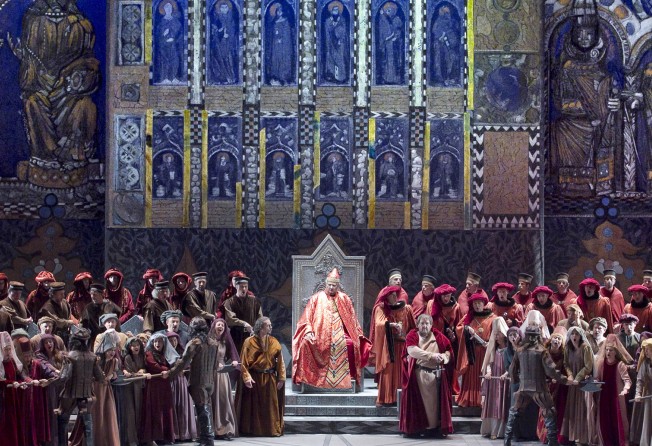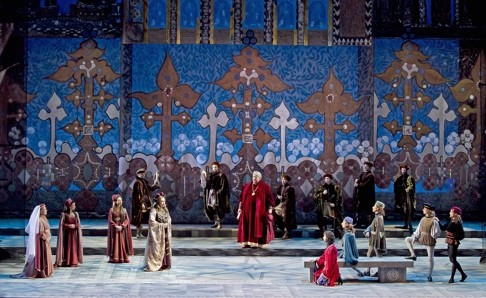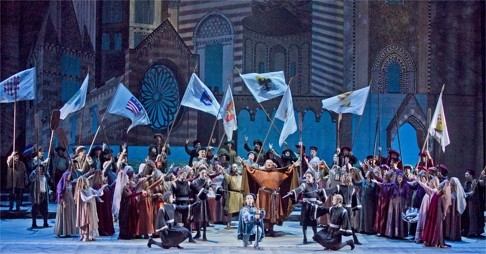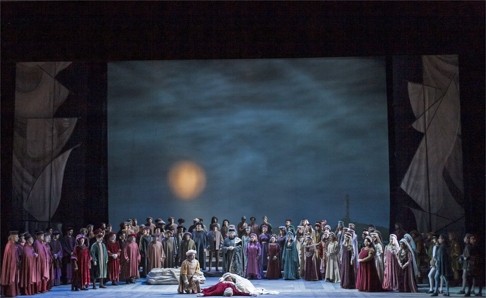Verdi’s classic opera Simon Boccanegra making its Hong Kong debut
The upheavals of love and politics are at the heart of Verdi’s beloved work, presented here by Italian company Teatro Regio Torino under the baton of Roberto Abbado in a revival of its landmark 1979 staging

“VIVA VERDI!” proclaimed the slogans, daubed on walls, or shouted out at meetings and demonstrations during the turbulent years in the middle of the 19th century in Italy.
And while anyone arrested could claim that they were simply declaring their love of opera, in truth they were passing on a dangerous (and for a long time illegal) message that it was time for unification and independence.
Because as well as spelling out the surname of one of the most popular composers the world had ever seen, the letters stood for “Vittorio Emanuele Re D’Italia” and called for the young king Victor Emmanuel of Sardinia to rule the whole of Italy, and divest the Austrian empire to the north and the Pope in the centre of their powers and lands.
Giuseppe Verdi the composer was as passionate as any of his compatriots that the country should be united. Not only did he give his name to the struggle, and later (after a first Italian parliament met in Turin in 1861) agree to be a Member of Parliament, but he also fired his popular opera full of melodies and messages to support the cause.
And perhaps the most moving political opera of all was Simon Boccanegra, being performed in Hong Kong for the first time next month, part of the Arts Festival.
Excitingly, it is being performed by Turin’s fabulous opera theatre company Teatro Regio Torino, and will be conducted by Roberto Abbado, the nephew of the conductor Claudio Abbado, who made one of the best acclaimed recordings of the opera, with La Scala, in 1979.
In 2014 Teatro Regio made a triumphant Edinburgh Festival debut, and its first visit to the United States in that same year was hailed by The New York Times as “one of the highlights of recent years”, and as one of the “Top Ten Performances of 2014” by Chicago Classical Review.
The company comes from one of the best established opera houses in Italy. The original theatre was built in 1740: Puccini wrote for it, Toscanini was its first music director, La Bohème premiered in it, and the philosopher Friedrich Nietzsche attended its operas.

Because behind the baroque exterior was a new modernist arts centre, daringly designed by celebrated architect Carlo Mollino with reinforced concrete, curvilinear forms and elliptical shapes.
Initially there was carpeting in the auditorium, but when that was swapped out for beech wood on every surface, with central lighting in a cloud of 3,600 sticks of coloured Perspex, the acoustics became wonderful.
Simon Boccanegra is the story of the elected ruler of Genoa, a man with some dark secrets.
Once, long ago, he was a pirate captain, who had a love affair with the daughter of a powerful man. At that time his baby daughter was abducted, and Boccanegra is not the only person looking for her.
At the beginning of the opera the girl reappears, but the big questions are: is it too late? And who can Boccanegra trust?

“You hear the sound of the people complaining, the crowd trying to throw down the government. The soldiers ask Boccanegra, what do we do? And he says open the doors bring the revolutionaries into the council.
“And that’s a fantastic moment, when the crowd comes in trying to hurt the government. And Simon Boccanegra has a big solo talking about uniting the forces which made Italy strong.
“Verdi uses the words of one of the first Italian poets, Petrarch, who had an ambition for the unity of Italy in the Renaissance … it is hard to hear that and not be stirred.”
The opera is by Verdi, so as well as the politics it includes the element of love, with the tenor and soprano falling in love and combating all the problems they encounter on the way. But it has another important element too, one that was also dear to Verdi: paternity.

“But just as he started both his wife and his infant daughter died, and imagine the pressure – to make people laugh when he was crying inside,” says Fournier-Facio.
That opera was hissed off stage and closed after a night, and yet forever after, Verdi kept coming back to the same subject.
Perhaps, Fournier-Facio says, it was one of the reasons that his music is so great and has lasted through the years.
Because beneath the lightness and the comedy, there is a darkness that means that this is popular art that matters.
“Simon Boccanegra”, Teatro Regio Torino conducted by Roberto Abbado. Feb 26, 7.30pm, Feb 28, 2.30pm, Mar 1, 7.30pm. Verdi and Wagner Opera Gala, Feb 27. Grand Theatre, Hong Kong Cultural Centre, Tsim Sha Tsui. Tickets: HK$450 to HK$1,480.